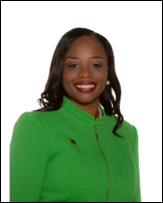
Ruthmae Sears, Ph.D., is a Professor at the University of South Florida for secondary mathematics education, the Associate Director of Coalition for Science Literacy with a focus on inclusive excellence, and the lead faculty facilitator for the university’s newly created Inclusive and Equitable Pedagogy program. Her research focuses on curriculum issues, systemic change initiatives in K–20 STEM settings, the development of reasoning and proof skills, clinical experiences in secondary mathematics, and the integration of technology in mathematics.
1. What’s your earliest memory of doing mathematics?
Growing up in The Bahamas, I was raised in a supportive family and often mirrored my older sister's actions. I can recall in Grade 1 going to my sister's class in Grade 6 to get mathematics problems from her teacher to practice with. Her teacher always had a worksheet for me. I often asked my sister to explain it and ensure I could complete the homework accurately. Additionally, I always finished my assignment quickly in Grade 1 to focus on the mathematics tasks I got from my sister's sixth-grade teacher. This experience helped me conceptualize the Vygotsky zone of proximal development since I was learning content grades ahead of me based on the support of my sister and her teacher, as well as my Grade 1 teacher, who allowed me to challenge myself.
2. How has mathematics education changed in the time you have been involved in it?
The aim of mathematics has evolved from technological pragmatism, which focuses on meeting industry needs, to being progressive by emphasizing a need to be learner-centered and promote social justice (Ernest, 2018). I recall teachers emphasizing the mathematics and technological skills needed to enter the workforce. However, over time there has been greater attention to how mathematics can address inequities within the community and promote a just and equitable society. Thus, increased effort is placed on posing culturally relevant mathematics tasks and using mathematics to examine social phenomena.
3. Tell me about a time in your career when something totally flabbergasted you.
To humanize mathematics, I often say, "I teach PEOPLE mathematics," rather than, "I teach mathematics." Thus, a moment that made me speechless was when my undergraduate and graduate students in my high school methods course hosted a surprise party for me in honor of International Women's Day. The students in the class bought me desserts, flowers, and a book. They told me they did it because I inspired them to be the best mathematics teachers possible. The students' attitude of gratitude and their positive gesture further motivated me to persist and strive to be a model mathematics teacher educator.
4. Do you practise mathematics differently in company?
I emphasize the NCTM (2000) mathematical process standards among my peers and in social interactions with community members. Particularly, I help individuals make sense of the problem, engage in reasoning and generate arguments that could be substantiated (i.e., proven), and reflect on how technology can help clarify the ideas shared. Thus, in my interactions, I reflect on the applications of mathematics and the appropriate processes that can help individuals conceptualize an idea and consider its relevance.
5. Do you think a brilliant maths teacher is born or made?
I believe in the axiom of brilliance (Rubenstein et al., 2022), which lies within all of us. Thus, all mathematics teachers have the potential to establish high expectations for their students and can work to reduce barriers students face, thereby ensuring students attain success. Therefore, mathematics teachers are encouraged to demonstrate technological pedagogical content knowledge and adapt to meet the needs of their students. Thus, as brilliant human beings, guidance is needed on how to apply knowledge to promote learning and support students’ academic growth and development of a robust mathematical identity.
6. What’s the most fun a mathematician can have?
Engaging in cognitively demanding mathematical tasks and working to arrive at a solution is always fun for a mathematician. It’s a delight to reflect on multiple pathways and representations that can be employed to solve a task. The process allows individuals to consider different perspectives and the extent to which an argument is complete. Thus, it creates an intellectual stimulus and a sense of accomplishment, knowing that you can persist and engage in productive struggle.
7. Do you have a favourite maths joke?
I admit that I have a great sense of humor. So, I often smile at knock-knock jokes, geometry and algebra jokes, cartoons, or math puns. Jokes about Pi going on forever are amongst my favorites. There are so many jokes on the internet, so I often search for one that aligns with the lesson I am teaching and include it to lighten the mood for the class.
References:
Ernest, P. (2018). The philosophy of mathematics education: An overview. In The philosophy of mathematics education today: ICME-13 Monographs (pp. 13–35). Springer.
National Council of Teachers of Mathematics. (2000). Principles and standards for school mathematics. NCTM.
Rubenstein, L. D., Sandifer, C. B., & Spoon, R. (2022). Reimagining IDEA using the axiom of brilliance. Phi Delta Kappan, 103(6), 21–26.
Join the conversation: You can tweet us @CambridgeMaths or comment below.